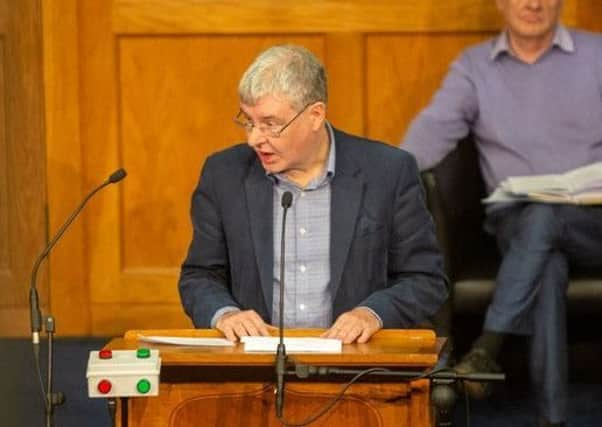Presbyterian general assembly: We must face up to cracked past of Troubles, not paper over cracks, says church


At Wednesday’s general assembly, Tony Davidson, convenor of the church’s Dealing With The Past project, said the conflict resulted in “cracks” in families, churches, villages and towns throughout Northern Ireland.
He said: “While wider society appears to paper over those cracks, in the Presbyterian Church we have sought to face up to and bring healing to our cracked past.”
Advertisement
Hide AdAdvertisement
Hide AdRev Davidson, from First Presbyterian Church in Armagh, led the task group which spent three years exploring how Presbyterians responded to the Troubles from 1968 to 2000.
The task group’s remit is to “tell a wider story than has been available to date, to acknowledge both what is good but also to reflect upon the times when Presbyterians failed to be faithful peacemakers”.
Research by the panel found that “many victims/survivors felt that while the pastor at the time of the tragedy was supportive, the church as an institution and succeeding pastors have been less attentive”.
It also stated that “the lack of an agreed societal manner of dealing with the legacy of the past is directly affecting present day relationships”.
Advertisement
Hide AdAdvertisement
Hide AdTheir work will culminate with the publication of a book entitled ‘Consider Grace’ later this year, around Remembrance Sunday.
It features 100 stories from ministers and their spouses, victims, members of the security forces, first responders, politicians, quiet peacemakers, along with critical friends, and some who have left the denomination.
“We have not tried to cover up the variety of views among Presbyterians about the past,” said Rev Davidson.
“Some stories are heart breaking and tear jerking. Grown Presbyterian ministers and elders will cry.
Advertisement
Hide AdAdvertisement
Hide Ad“Some stories are heart warming and grace filled. Some stories are heart challenging and deeply disturbing.”
Stephen Johnston of Kilkeel Presbyterian Church remarked that the past was a “foreign country that some people don’t want to visit”, especially the perpetrators of violence.
In a separate report before the general assembly about addressing the legacy of the Troubles, the Presbyterian Church recorded its concern about the definition of a victim.
The church stated: “We remain greatly exercised that the legal definition of a victim makes no distinction between the perpetrators of violence and those attacked. This is morally unacceptable.
Advertisement
Hide AdAdvertisement
Hide Ad“A serious effort must be made to deal with the sense of moral and judicial outrage and hurt that this causes. We realise that there are strongly opposing narratives about the past, but are convinced that a failure to face this distinction in some coherent way will make progress more difficult.”
In its response to the NI Office’s legacy consultation paper, the PCI said: “Meaningful discussion about reconciliation and related concepts of forgiveness, grace, remorse and repentance is also worryingly absent.”
A Presbyterian elder has expressed his concern that the lack of repentance from terrorists could be turned against Troubles’ victims.
Commenting on the PCI’s response to the NI Office’s legacy consultation paper, Ravenhill Presbyterian Church’s Paul Kingsley said: “Many victims feel that in the absence of repentance there cannot be forgiveness and hence true reconciliation. We have been told people regret things but that’s consistent with saying we regret that we had to kill all those people but we did have to kill them because you didn’t give us what we wanted.
Advertisement
Hide AdAdvertisement
Hide Ad“It’s important we go for the genuine article of Biblical repentance rather than expressions of regret.”
However, he warned it could be turned against victims by saying they are “concentrating on recrimination rather than reconciliation because they insist on repentance before forgiveness”.